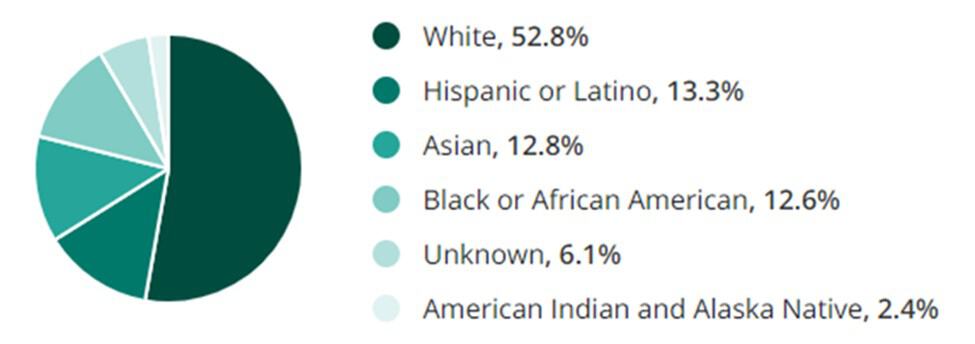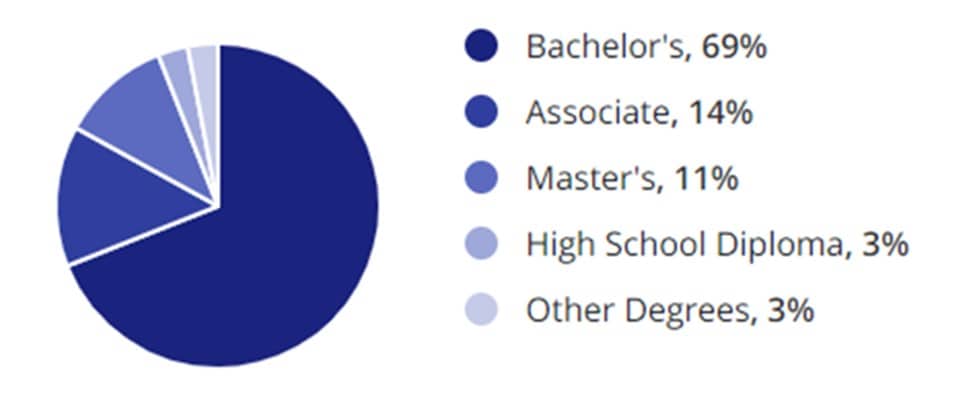Welcome to your comprehensive guide for launching or advancing your career in the dynamic world of science jobs. The possibilities are practically limitless in a domain as vast and varied as science. From exploring the mysteries of the universe in astrophysics to addressing global health challenges in medical research, a career in science is one of the most rewarding paths you can choose. It’s a journey that allows you to satisfy your curiosity about the world around you and offers the chance to make significant contributions to society.
This guide is designed to piece together the many avenues available in science careers, spotlighting the education requirements, areas of expertise, and skills needed to succeed. Whether you’re a student contemplating an associate of science degree, a professional eyeing medical science liaison jobs, or someone fascinated by geo-information science jobs, this guide gives you the tools and insights to step confidently into the future of your dreams. Let’s begin this journey together, exploring how you can turn your passion for science into a rewarding career.
Educational Requirements
Starting a career in science begins with a solid foundation in basic sciences during your high school years. You’ll need a bachelor’s degree in a field that sparks your interest in stepping into the world of science jobs. For those aiming for advanced roles, a master’s degree or Ph.D. is often a must-have. In the constantly evolving field of science, staying up-to-date with certifications and ongoing professional learning is critical to keeping up with discoveries and technologies.
Fields like biotech, our Ultimate Guide to Biotech Jobs can shed more light on this career path, and science education underlines the value of specialized training. Whether you’re eyeing associate of science degree jobs or diving deep into research with a Doctorate, the right educational background is crucial. This includes opportunities for medical science liaison jobs, geo-information science jobs, and even geospatial science internships, paving the way for a fulfilling career in science.
Areas of Expertise
The field of science boasts a vast array of specialties, each offering unique pathways to discovery and innovation. Here are some key areas:
- Biological Sciences: This branch studies living organisms and their environmental interactions. It’s a broad category that spans everything from genetics to ecology.
- Chemical Sciences: This area focuses on the composition, structures, properties, and changes that matter undergoes. It’s essential for those interested in developing new materials or studying the substances that make up our world.
- Physical Sciences: Covering physics and astronomy, this discipline explores the non-living systems, unraveling the laws that govern the universe and everything in it.
- Earth Sciences: For those fascinated by our planet, this field encompasses geology, meteorology, and oceanography, offering insights into Earth’s processes and past, present, and future.
- Environmental Sciences: An interdisciplinary field that merges physical, biological, and information sciences to study the environment and solve its issues.
- Medical and Health Sciences: This specialty applies scientific principles to health and medical practices, crucial for those looking to engage in medical science liaison jobs and related roles.
From discovering new species in untouched ecosystems to developing sustainable technologies, each area of expertise allows for exploring the unknown.
Demographics in the United States
While predominantly white, the landscape of science jobs in the U.S. is becoming more inclusive, valuing diverse perspectives and backgrounds. Here’s a closer look:
Ethnicity/Race:
- White: 52.8%
- Hispanic or Latino: 13.3%
- Asian: 12.8%
- Black or African American: 12.6%
- Unknown: 6.1%
- Native American and Alaska Native: 2.4%
The breadth of ethnicity and race within the field underscores the broad appeal of scientific inquiry and the ongoing need to foster even greater inclusion.

Gender:
- Male: 61.7%
- Female: 38.3%
While the gap points to more males in science roles, proactive efforts are underway to balance these figures and open doors for more women in science, aiming for equal representation across all levels, from lab technicians to lead researchers. In science jobs, despite constituting less than 40% of the workforce, women earn slightly more, making $1.01 for every dollar their male counterparts earn. This statistic highlights a unique earnings dynamic in an industry where women are still significantly underrepresented.

Age:
- The average age of professionals in science jobs is 40+ years, with a notable distribution across younger and older age groups.
This varied age range highlights the blend of youthful energy and seasoned wisdom that drives the field forward. Young professionals often bring new perspectives and dynamic approaches to research, while their experienced counterparts contribute deep knowledge and refined analytical skills.

Salary Trends
Salaries in science careers vary widely, influenced by factors like role, specialization, location, and funding source. Here’s a broad overview of what science professionals might expect:
- Entry-level positions often start around $50,000.
- Mid-career professionals can earn between $70,000 and $100,000.
- Senior researchers or lead scientists in well-funded institutions or companies may see salaries exceeding $130,000.
Medical science liaison jobs stand out for specific roles, offering competitive wages that reflect the high expertise required. Salaries are also rising in blossoming fields like geo-information science, reflecting the growing demand for specialists who can interpret and analyze geographical data.
Remember, these figures are averages, and earnings can differ based on numerous factors. Securing a role that matches your skills and interests in a supportive and inclusive workplace can lead to rewarding career growth and financial benefits.
Hiring Trends
The science sector is experiencing steady growth, with an estimated increase of 6% over the next few years. This upward trend reflects the ongoing demand for skilled professionals who can contribute to technological advancements, the healthcare sector, and environmental solutions. Here’s what’s shaping the hiring landscape:
- Technological Advancements: Fields integrating technology and science, such as computational biology and biotechnology, are seeing a surge in export demand.
- Sustainability and Climate Change: Professionals with expertise in environmental science and sustainable technologies are increasingly sought after as the world confronts climate challenges.
- Health and Medical Research: The health sector needs scientists for research and development, particularly in roles focused on addressing pandemic-related challenges and chronic diseases.
Moreover, internships and early-career opportunities serve as gateways for those looking to enter the field, offering hands-on experience and entry into the professional science community.
While traditional roles remain essential, emerging fields create new opportunities. The science job market is dynamic, with employers valuing diversity in thought, background, and approach to drive innovation and research.
Education Levels
The pathway to a career in science is diverse, and the educational requirements can vary significantly based on the specific job role. Here’s a breakdown of the typical education levels within the science sector:
- Bachelor’s Degree: This is the entry-level requirement for many science jobs. Roles such as laboratory technicians, research assistants, and some associate of science degree jobs fall into this category.
- Master’s Degree: A higher qualification that opens doors to more specialized positions. It is often required for management roles or positions involving more complex research tasks.
- Ph.D.: Essential for careers in academia and advanced research. A Doctorate can lead to opportunities as a principal investigator, university professor, or high-level research director.
- Post-Doctoral Training: An additional step for those seeking to delve further into research or specialize in a particular field. Post-doctoral positions are standard in highly competitive areas like medical research and environmental science.
Regardless of the level, continuous learning and professional development are crucial in keeping pace with scientific advancements and technological innovations. Engaging in workshops, seminars, and certification programs can enhance your skills and improve your prospects in diverse and inclusive workplaces.

Skills in Demand
Specific skills stand out to employers in science jobs, distinguishing potential candidates in a competitive job market. Here’s a snapshot of vital skills that are currently in high demand:
- Technical Expertise: A deep understanding of your specific area of science—be it biotechnology, environmental science, or another field—is essential.
- Research and Analytical Skills: The ability to design experiments, analyze data, and draw meaningful conclusions is crucial for most science jobs.
- Problem-Solving: Science is about solving puzzles. Whether you’re developing a new medicine or studying climate change, the ability to think critically and creatively solve problems is invaluable.
- Communication: Scientists must share their findings with the world. Strong writing and speaking skills help write reports, publish research findings, and present at conferences.
- Teamwork and Collaboration: Science often involves working in teams. Collaborating effectively with colleagues, both within and across disciplines, enhances the impact of your work.
- Project Management: Organizing research, managing timelines, and overseeing budgets are vital for leading projects and teams.
- Adaptability: The field of science is fast-paced and ever-changing. Adapting to new technologies and methodologies keeps professionals at the forefront of their field.
Beyond these core skills, don’t underestimate the value of internships and entry-level positions for developing practical experience. Fields like medical science liaison jobs as well as geo-information science are increasingly interdisciplinary, requiring broad skills and the agility to apply them across various contexts.
Current & Future Science Jobs Outlook
The outlook for science jobs remains optimistic, with several fields poised for growth in response to global challenges and technological advancements. Here’s what future scientists can anticipate:
- Environmental Science: With the escalating concern over climate change, the need for environmental scientists is more critical than ever. Roles focusing on sustainability, renewable energy, and conservation are expected to grow substantially.
- Health and Medicine: The healthcare sector continues to expand, driven by an aging population and ongoing health crises. This means a steady demand for medical researchers, medical science liaison professionals, and public health experts.
- Technology Integration: Fields like bioinformatics and computational biology are at the crossroads of technology and science. Scientists who can bridge these areas will find increasing opportunities as research becomes more data-driven.
- Education and Communication: There’s a high demand for qualified educators for science and communicators who can simplify complex concepts for the general public and inspire the next generation of scientists.
The future of science jobs is not just about today’s challenges but also the untapped potential of tomorrow’s innovations. Aspiring scientists with a passion for discovery and a drive to make a difference will find a landscape rich with opportunities for career growth and meaningful contributions to society.
FAQ’s
What educational background do I need to start a career in science?
A bachelor’s degree in a science-related field is typically the minimum requirement. Also, for advanced research positions or academia, a master’s degree or Ph.D. is often necessary.
Are internships important for launching a science career?
Yes, internships provide practical experience, helping you apply theoretical knowledge in real-world settings. They’re valuable for networking and can sometimes lead to full-time job offers.
What skills are most important for science jobs?
While specific skills vary by field, common critical skills include technical expertise, analytical thinking, problem-solving, communication, and teamwork.
Is there a demand for science jobs?
Yes, the demand for skilled science professionals continues to grow. Especially, in areas addressing environmental concerns, health and medical research, and technological integrations.
Can I work in science with a degree in another field?
Yes, many science jobs value interdisciplinary knowledge. Additional qualifications, certifications, or relevant experience can help transition into a science career.
What are the salary expectations in science careers?
Salaries vary widely based on role, experience, location, and specialty. Entry-level positions might start around $50,000, potentially exceeding $130,000 in senior roles or specialized fields.
How can I stay updated on advancements in my field?
Staying engaged with professional organizations, attending conferences, and keeping up with scientific journals and publications are great ways to stay informed.
Additional Resources
Building a career in science is an exciting journey, and many resources are available to support your path. Here are some valuable tools and sources of information:
- The National Science Foundation (NSF) offers grants, fellowships, and other funding opportunities for scientists at all stages of their careers, from students to seasoned professionals.
- The National Institutes of Health (NIH) is a crucial resource for anyone interested in medical and health sciences, providing access to extensive research, funding, and educational resources.
- The American Association for the Advancement of Science (AAAS) is the world’s largest general scientific society. It publishes the well-regarded journal “Science” and provides career development resources and networking opportunities.
- For those in environmental science, the Environmental Protection Agency (EPA) website offers information on environmental laws, regulations, and available careers focused on protecting human health and the environment.
- The U.S. Geological Survey (USGS) provides a wealth of resources for earth scientists, including data, maps, and various publications.
These resources can provide insights and funding for your projects and opportunities for collaboration, mentorship, and professional growth in the diverse world of science.
Conclusion
In the evolving field of science jobs, opportunities are plentiful for those with curiosity, dedication, and a passion for discovery. Whether starting with an associate of science degree or aiming for specialized roles through medical science liaison jobs, the journey is filled with endless possibilities. Remember, by continuous learning, honing in-demand skills, and staying ahead of trends, you can forge a successful career that fulfills your aspirations and contributes to the greater good.
We encourage you to explore our diversity job board further and take active steps toward your dream science career. Join Diversity Employment today, upload your resume, and apply for your dream science job today. You’ll be connected with employers who value diversity and innovation. Let’s unite to create a future where everyone can explore, discover, and impact the scientific community!




